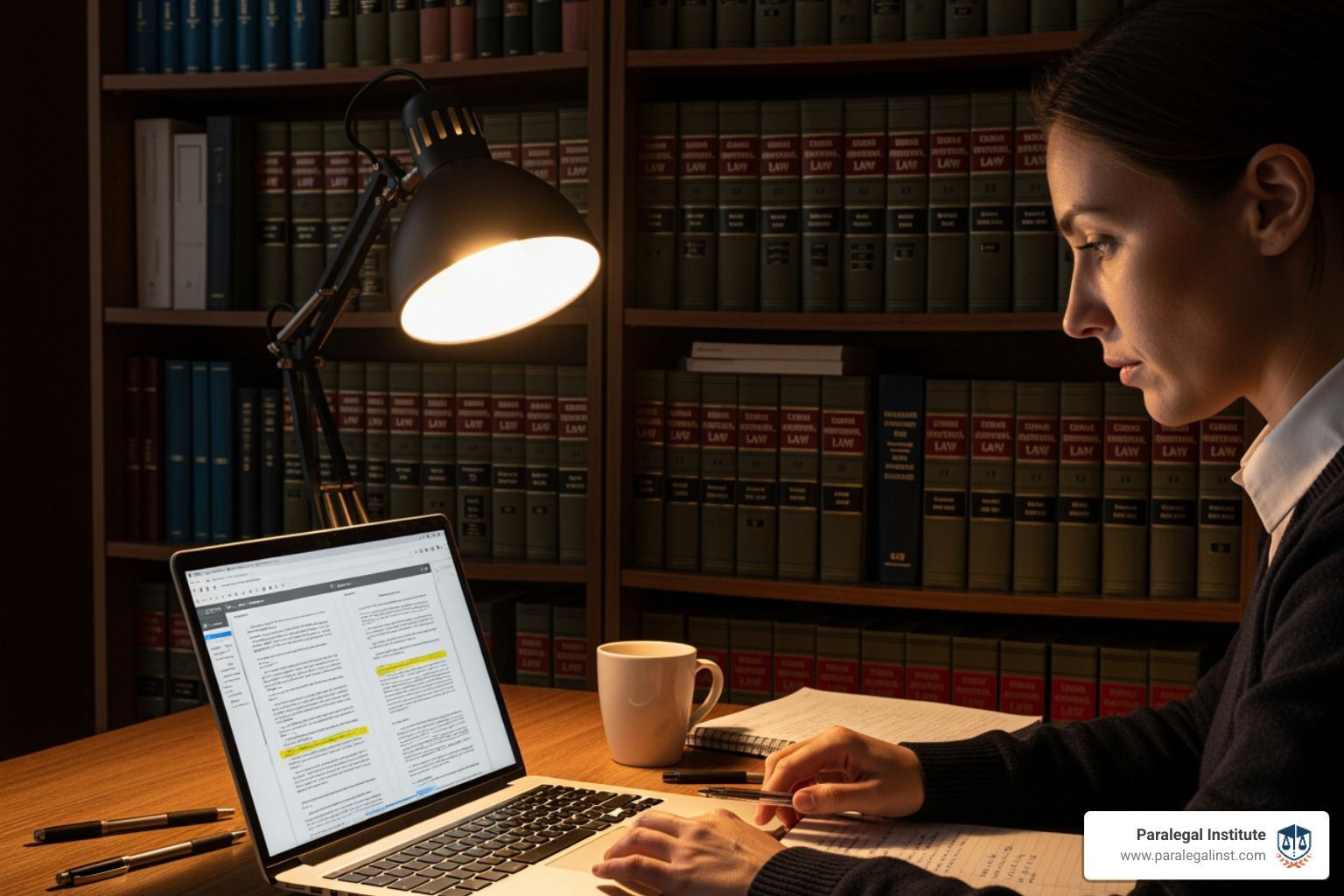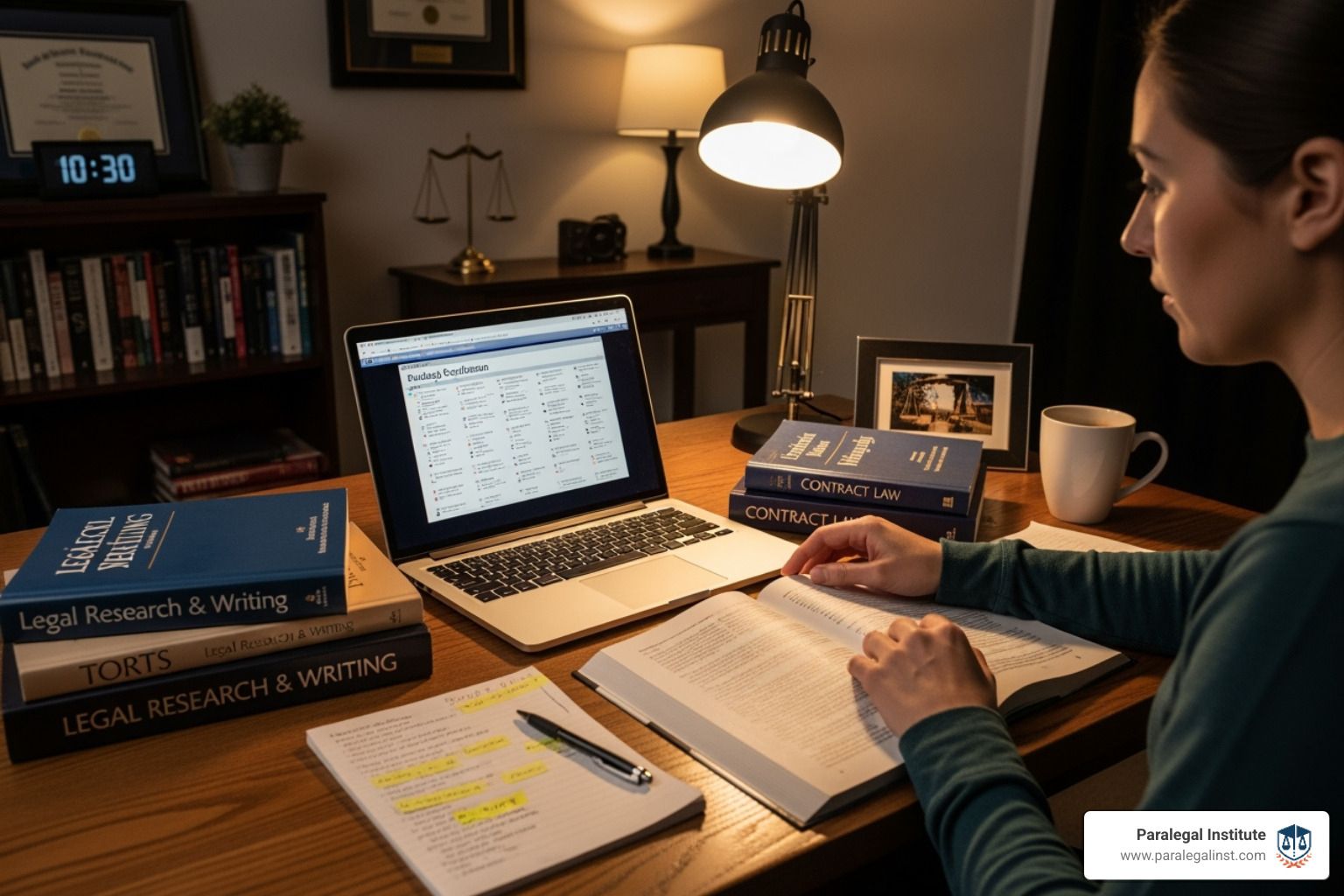Common Legal Topics Covered in Paralegal Certification
Becoming a paralegal is an exciting journey into the legal world, offering unique chances to assist lawyers and help clients navigate legal challenges. With a paralegal certificate in hand, you are armed with the skills needed to address various legal matters. This certification is not just a piece of paper; it's a gateway to understanding the core elements that make legal systems work and thrive.
Covering common legal topics throughout the certification process is essential. This foundation paves the way for a successful career by equipping you with the knowledge necessary to assist in a wide range of legal settings. By grasping these topics, you'll find yourself well-prepared and confident as you step into your professional role.
Basic Legal Concepts
Grasping the basic concepts of civil and criminal law is like learning the ABCs of the legal world. Civil law often involves disputes between people or organizations—like a neighborly disagreement over property lines. Meanwhile, criminal law refers to actions identified as offenses against the state, such as theft or assault. Understanding these distinctions lays the groundwork for effective legal work, making you a valuable asset on any legal team.
Jurisdiction is another key concept, dictating where a case can be heard. Imagine a disagreement arising in Las Vegas; knowing which court has the authority to hear the case is crucial. It ensures that the legal process runs smoothly and efficiently, which is exactly what clients and legal professionals need.
Legal Research and Writing
Strong research and writing skills are among the most important tools in a paralegal’s toolkit. Effective research involves knowing where to look and how to search efficiently. Think of it as a treasure hunt for legal precedents and relevant case laws. Online databases and legal libraries become treasure maps guiding your search, helping you find the crucial details that support your team’s case.
Drafting documents is another vital skill. From preparing contracts to drafting formal letters, clear and concise writing ensures legal communications are both accurate and respectful. Here’s a quick example of what a paralegal might draft:
- Formal letters to clients or other parties
- Summaries of legal research findings
- Drafts of motions or pleadings for court filings
Each document needs to reflect professionalism and precision, ensuring that all communications meet legal standards and resonate well with clients and colleagues alike.
Ethics and Professional Responsibility
Understanding ethics and professional responsibility is crucial for anyone working in the legal field. Paralegals must adhere to a code of ethics that ensures they conduct themselves with integrity and confidentiality. Imagine handling sensitive client information; respecting confidentiality not only builds trust but also keeps you compliant with legal standards. This means consistently acting in a manner that upholds the legal profession's reputation while protecting client information.
A paralegal’s role often involves assisting lawyers in tasks such as preparing legal documents, communication with clients, and even attending court sessions. During these interactions, maintaining a high degree of professionalism and ethical behavior is mandatory. This involves ensuring clarity in communications and being honest about what can or cannot be done in a legal context. Such integrity is what fosters a trustworthy relationship not just with clients, but also within the legal community.
Specific Areas of Law
Diving into specific areas of law enhances a paralegal’s effectiveness and contributes to their professional growth. Areas such as family law, corporate law, and criminal law each offer unique challenges and learning opportunities. For example, working in family law involves dealing with cases like divorce or child custody, which require a deep understanding of emotions and sensitive issues. Knowing the ins and outs of these areas helps you become a specialized resource in your legal team.
In Las Vegas, a paralegal familiar with corporate law might find themselves dealing with business regulations and assisting in the development of contracts. Similarly, understanding criminal law empowers a paralegal to handle tasks related to criminal proceedings, from gathering case histories to managing legal documentation required in court. This specialized knowledge not only enhances your expertise but also makes you a key player in effectively supporting your attorney's work across various legal disciplines.
Legal Procedures and Court Systems
Legal procedures and court systems form the backbone of a paralegal's daily responsibilities. Familiarity with court structures helps ensure proper document submission and adherence to procedural timelines. This knowledge minimizes the risk of errors which can result in delays or unfavorable outcomes. For example, understanding how to file motions or what to include in legal briefs ensures that court proceedings flow smoothly.
Navigating administrative procedures and filings is another vital task. From creating legal briefs to understanding filing deadlines, these elements require attention to detail and a methodical approach. An equipped paralegal knows the importance of following correct steps, such as acquiring necessary signatures and ensuring all documentation is complete. This kind of meticulous attention allows a paralegal to support their legal team effectively and ensures that all legal proceedings are conducted without a hitch.
Advancing Your Legal Career with a Paralegal Certificate
Your path toward becoming a skilled paralegal involves a thorough understanding of diverse legal topics and skills. With a paralegal certificate, you’re not just prepared to enter a courtroom or a lawyer's office; you're equipped with the tools to make a difference in your professional environment. From ethics and legal procedures to diving into special areas of law, the knowledge you accumulate will serve you well throughout your career.
The journey doesn't end with obtaining a certificate. Each day as a paralegal presents opportunities to apply what you've learned and gain valuable experience. Arm yourself with curiosity and the willingness to learn, and you will continually grow within the legal domain. By honing your skills and understanding the complexities of the lawful world, you'll establish yourself as an invaluable asset in any legal team.
Ready to advance your legal career with comprehensive skills and valuable insights? Discover more about obtaining a paralegal certificate through the Paralegal Institute. Prepare yourself for the challenges of the legal field and become an indispensable asset in your team. Equip yourself with the knowledge and expertise to support your legal team confidently and efficiently.










